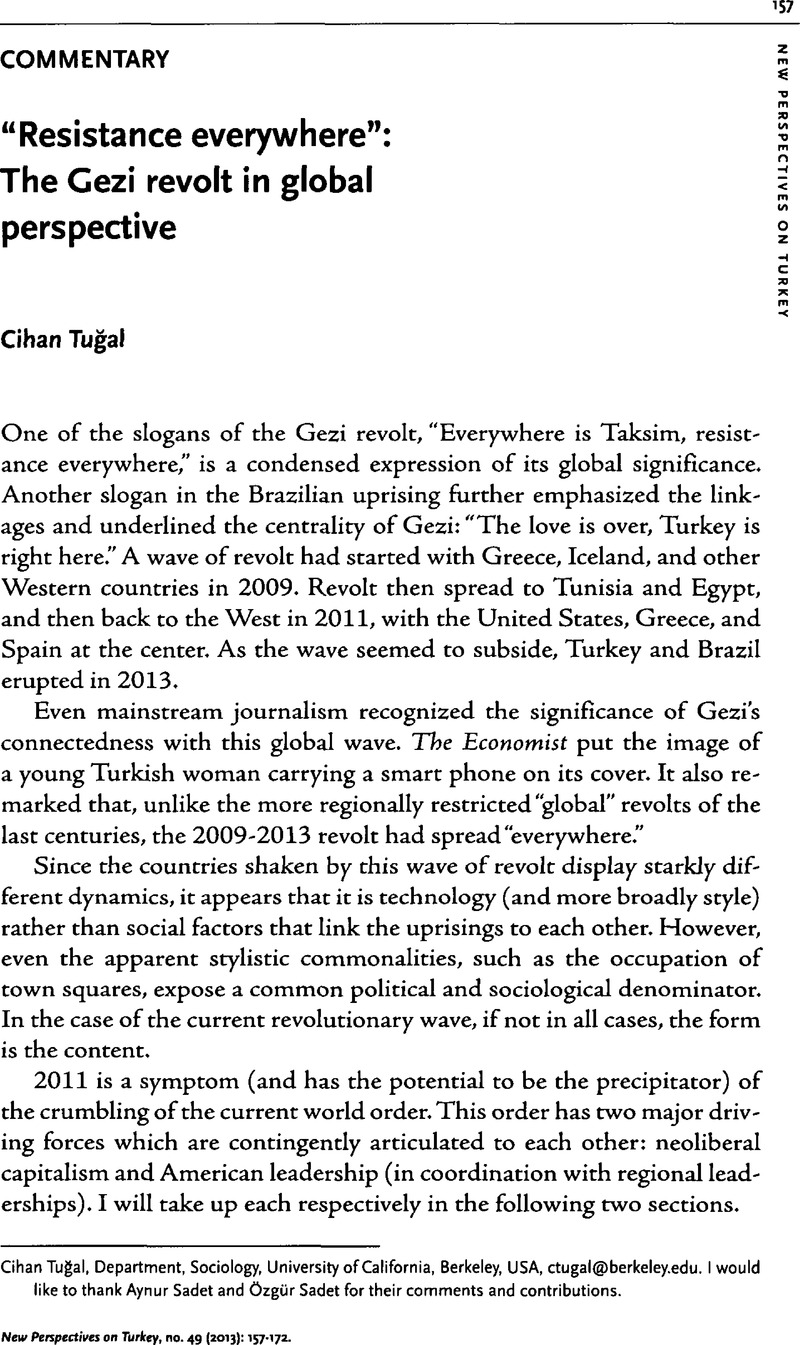Article contents
“Resistance everywhere”: The Gezi revolt in global perspective
Published online by Cambridge University Press: 05 March 2015
Abstract

- Type
- Commentary
- Information
- Copyright
- Copyright © New Perspectives on Turkey 2013
References
Cihan Tuğal, Department, Sociology, University of California, Berkeley, USA, ctugal@berkeley.edu. I would like to thank Aynur Sadet and özgür Sadet for their comments and contributions.
1 For the links between the crisis of capitalism and the Gezi revolt, see Wallerstein, Immanuel “Uprisings Here, There, and Everywhere,” Femand Braudel Center: Commentaries 356, July 1, 2013, http://www2.binghamton.edu/fbc/commentaries/archive-2013/356en.htm/ Google Scholar and Žižek, Slavoj “Trouble in Paradise,” London Review of Books 35, no. 14: 11–12.Google Scholar
2 Polanyi, Karl The Great Transformation (Boston, MA: Beacon Press, 2001).Google Scholar
3 Fregonese, Sara “Mediterranean Geographies of Protest,” European Urban and Regional Studies 20 (2013): 109–14.CrossRefGoogle Scholar
4 Mert, Nuray “Paradigmaların Çöküşü,” BirGün, June 28, 2013.Google Scholar
5 Only positivistic formalism chooses to ignore how police violence is tightly connected to broader issues in such revolts, especially those that are connected to class and capitalism. For an example, see Could, Roger V. Insurgent Identities: Class, Community, and Protest in Paris from 1848 to the Commune (Chicago: University of Chicago Press, 1995)Google Scholar and critical responses by Margadant, Ted The Journal of Modern History 70, no. 3 (1998): 710–12CrossRefGoogle Scholar and Voss, Kim International Labor and Working-Class History 52 (1997): 186–88.CrossRefGoogle Scholar
6 Panayotakis, Costas “Reflections on the Greek Uprising,” Capitalism, Nature, Socialism 20, no. 2 (Jun 2009): 97–101.CrossRefGoogle Scholar
7 For more on the Spanish revolt, see Hughes, Neil ‘“Young People Took to the Streets and all of a Sudden all of the Political Parties Got Old’: The 15M Movement in Spain,” Social Movement Studies 10, no. 4 (2011): 407–13.CrossRefGoogle Scholar
8 Memos, Christos “Neoliberalism, Identification Process and the Dialectics of Crisis,” International Journal of Urban and Regional Research 34, no. 1 (2010): 210–16.CrossRefGoogle Scholar
9 Douzinas, Costas “Athens Rising,” European Urban and Regional Studies 20, no. 1 (2013): 134–38. CrossRefGoogle Scholar
10 Charnock, Creig, Purcell, Thomas, and Ribera-Fumaz, Ramon, “Indignate!: The 2011 Popular Protests and the Limits to Democracy in Spain,” Capital of Class 36, no. 1 (2012): 7–9.CrossRefGoogle Scholar
11 Ibid., 3–11
12 Taibo, Carlos 2013, “The Spanish Indignados: A Movement with Two Souls,” European Urban and Regional Studies 20: 155–58.CrossRefGoogle Scholar
13 Charnock, et al., “Indignate!,” 4.Google Scholar
15 On the need to analyze specific countries with a structural logic as “links” in a “chain,” see Pou-lantzas, Nicos Fascism and Dictatorship: The Third International and the Problem of Fascism (London: Verso, 1974).Google Scholar
16 Beinin, Joel “Workers’ Protest in Egypt: Neo-liberalism and Class Struggle in 21st Century,” Social Movement Studies 8, no. 4 (2009): 449–54.CrossRefGoogle Scholar
17 For an overview, see Verdeil, Éric “Arab Cities in Revolution: Some Observations,” Metropolitiques.eu, February 25, 2011, http://www.metropolitiques.eu/Arab-Cities-in-Revolution-Some.html.Google Scholar
18 Caldeira, Teresa “Sào Paulo: The City and its Protests: Teresa Caldeira,” kafila.org, July 5, 2013, http://kafila.org/2013/07/05/sao-paulo-the-city-and-its-protests-teresa-caldeira/.Google Scholar
19 It should also be noted that cuts to education spending did not become an issue in Turkey, though the cuts became a major point of contention in Brazil. In Turkey, education is a highly politicized issue, with secular nationalists on one end of the spectrum and conservatives on the other, and it is difficult to re-politicize this issue in terms of redistribution.
20 See Tuğal, Cihan Passive Revolution: Absorbing the Islamic Challenge to Capitalism (Redwood City, CA: Stanford University Press, 2009);Google Scholar and Yörük, Erdem “Brazil, Turkey: Emerging Markets, Emerging Riots,” jadiliyya.com, July 21, 2013, http://www.jadaliyya.com/pages/contributors/147368.Google Scholar
21 Arrighi, Giovanni The Long Twentieth Century: Money, Power, and the Origins of Our Times (London: Verso, 1994).Google Scholar
22 The game of articulation might have different leading actors on different scales. For the national scale, see De Leon, Cedric, Desai, Manali and Tuğal, Cihan “Political Articulation: Parties and the Constitution of Cleavages in the United States, India, and Turkey,” Sociological Theory 27, no. 3 (2009): 193–219.CrossRefGoogle Scholar
23 Brenner, Robert “New Boom or New Bubble? The Trajectory of the US Economy,” New Left Review 25 (2004): 57–100.Google Scholar
24 See Tuğal, Cihan “Fight or Acquiesce? Religion and Political Process in Turkey’s and Egypt’s Neoliber-alizations,” Development and Change 43, no. 1 (2012): 23–51.CrossRefGoogle Scholar
25 See Boratav, Korkut “Olgunlaşmış bir sınıfsal başkaldırı…,” sendika.org, June 22, 2013, http://www.sendika.org/2013/06/her-yer-taksim-her-yer-direnis-bu-isci-sinifinin-tarihsel-ozlemi-olan-sinirsiz-dolaysiz-demokrasi-cagrisidir-korkut-boratav/.Google Scholar
26 Poulantzas, Nicos “The New Petty Bourgeoisie,” Critical Sociology 9 (1979): 56–60.Google Scholar
27 On a related note, Syriza’s defeat in the elections is a good warning to those who expect too much from elections in Turkey, where the socialists and communists are not as strong.
28 Hughes, “Young People Took to the Streets,” 411.Google Scholar
29 Ayan, Abdullah “Ispanya Öfkeliler hareketinden çıkarılacak dersler,” ufukturu.net, June 10, 2013, http://www.ufukturu.net/haberler/28767/ispanya-ofkeliler-hareketinden-cikarilacak-dersler.Google Scholar
30 Swyngedouw, Erik “Every Revolution Has Its Square,” cities@manchester (blog), March 18, 2011, http://citiesmcr.wordpress.com/2011/03/18/every-revolution-has-its-square/;Google Scholar Yildirim, Yavuz “Kent Aracılığı ile Ortak Olanı Kurmak: ‘Öfkeliler’ ve ‘işgal Et’ Hareketleri,” Mülkiye Dergisi 37, no. 1 (2013): 143–62.Google Scholar
- 85
- Cited by




